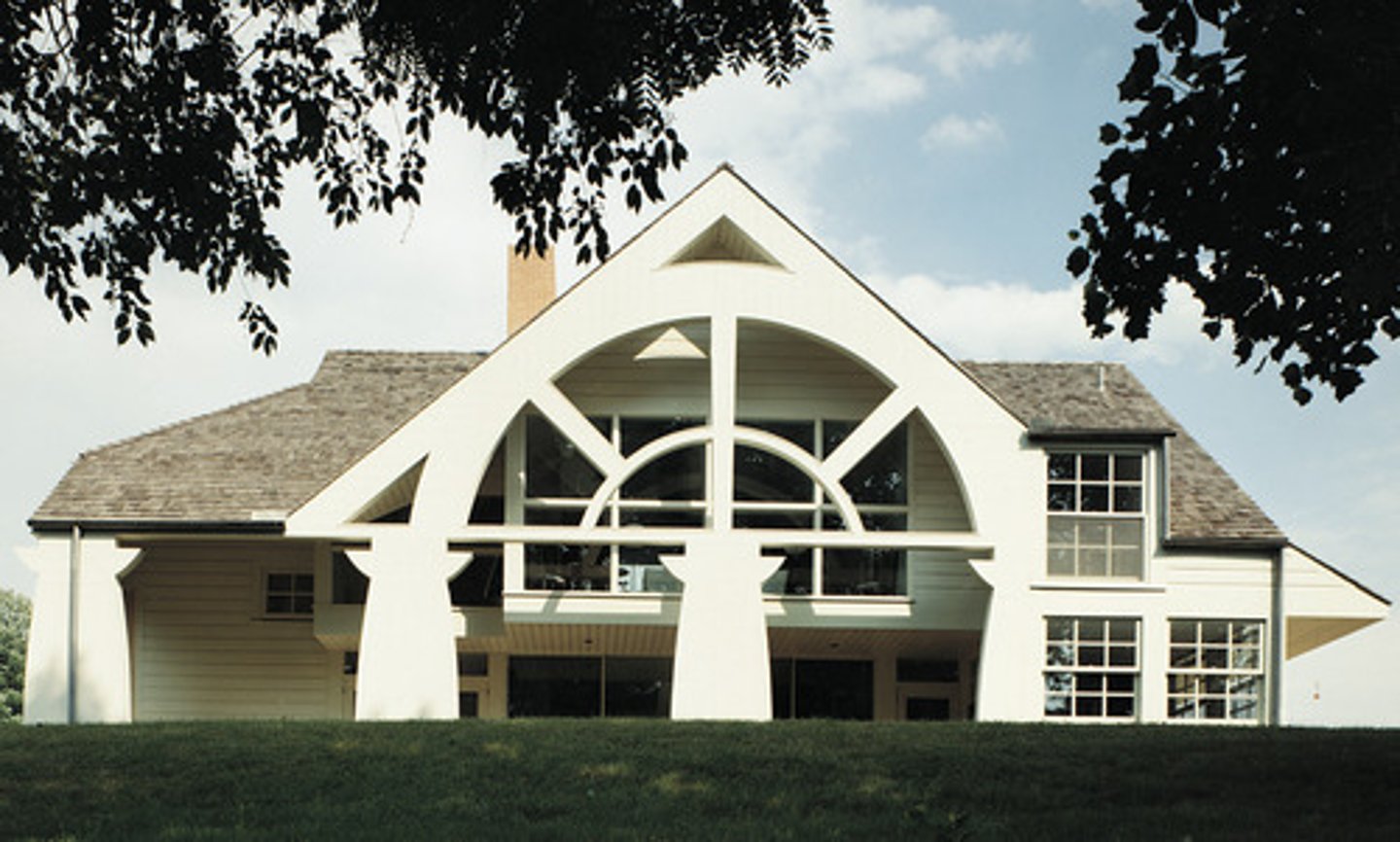Early and Mid-20th Century Art
1/25
There's no tags or description
Looks like no tags are added yet.
Name | Mastery | Learn | Test | Matching | Spaced |
|---|
No study sessions yet.
26 Terms
- still life painting
- violent contrasts of color
- thinly applied colors; white of canvas shows through
- energetic painterly brushwork
- may have been influenced by decorative quality of Asian art
- broad patches of color anticipate Color-Field painting later in century
Goldfish
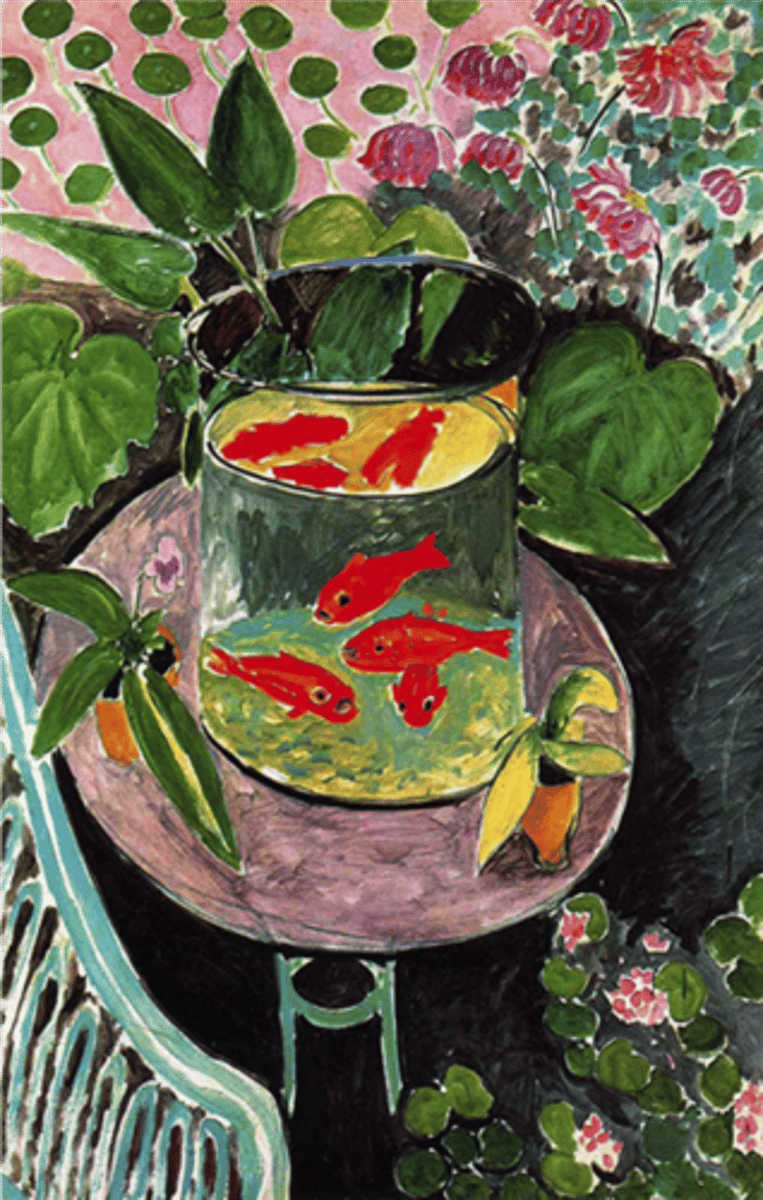
- movement toward abstraction; representational objects suggested rather than depicted
- title derived from musical compositions strongly articulated use of black lines
- colors seem to shade around line forms
- felt that sound and color were linked; Kandinsky generally believed to have synesthesia
- gave musical titles to works like "Composition" and "Improvisation"
- wanted viewer to respond to a painting the way one would to an abstract musical composition like a concerto, sonata, or symphony
Improvisation 28 (second version)
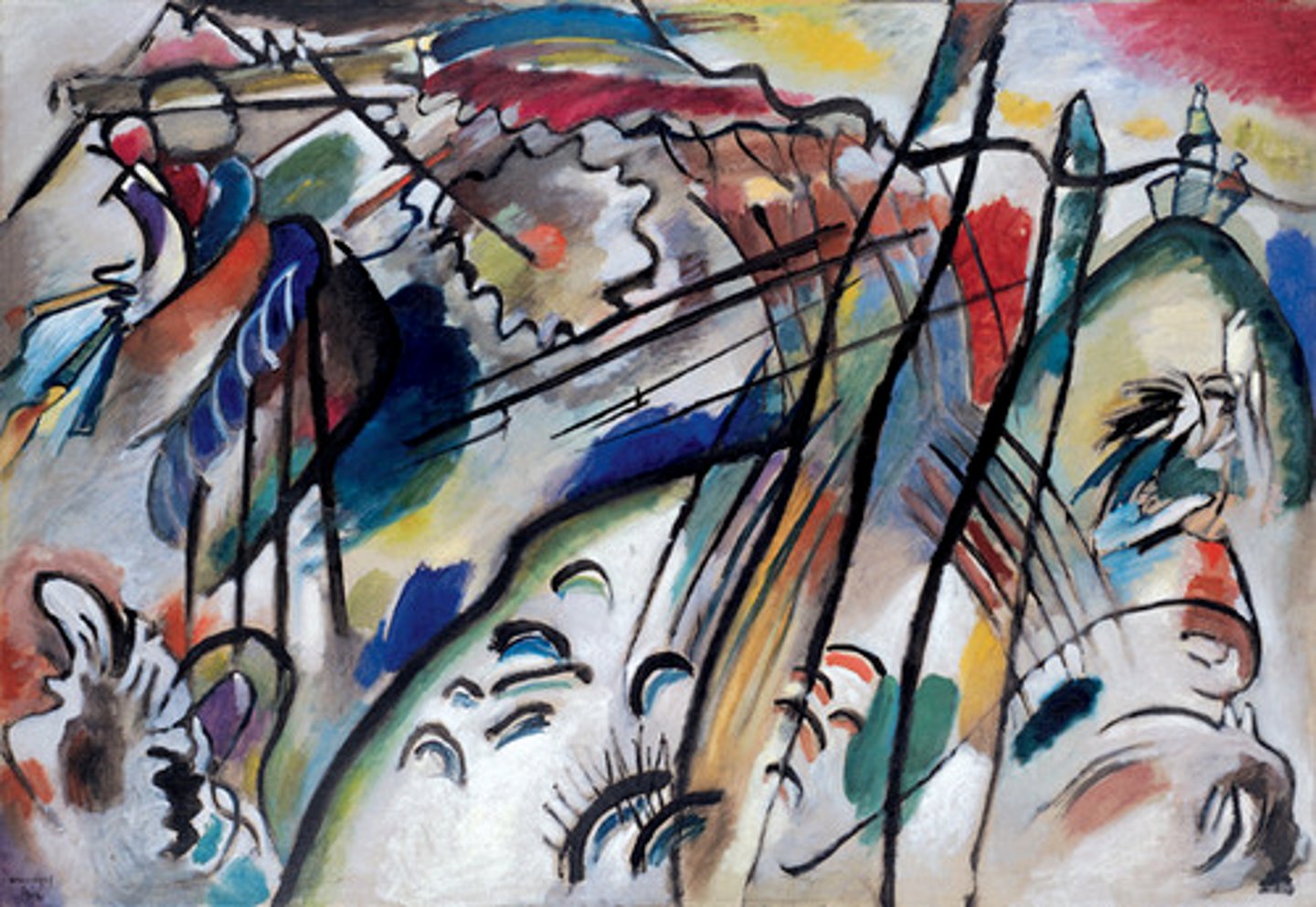
- "unwilling volunteer" driver in the artillery in WWI, rather than be drafted into infantry
- declared unfit for service; lung problems and weakness; mental breakdown-scholarly debate whether or not faked to avoid service
- painted during recuperation period
- drawn face; loss of right hand indicates his feeling that he has an inability to paint
- nude model represents what he used to paint, but no longer can
- nightmarish quality
- colors not representational, but symbolic and chosen to provide jarring impact
- expressive quality of horrified facial features and grim surroundings
- titled perspective moves things closer to the picture plane
- life plagues by drug abuse, alcoholism, then paralysis
Self-Portrait as a Soldier
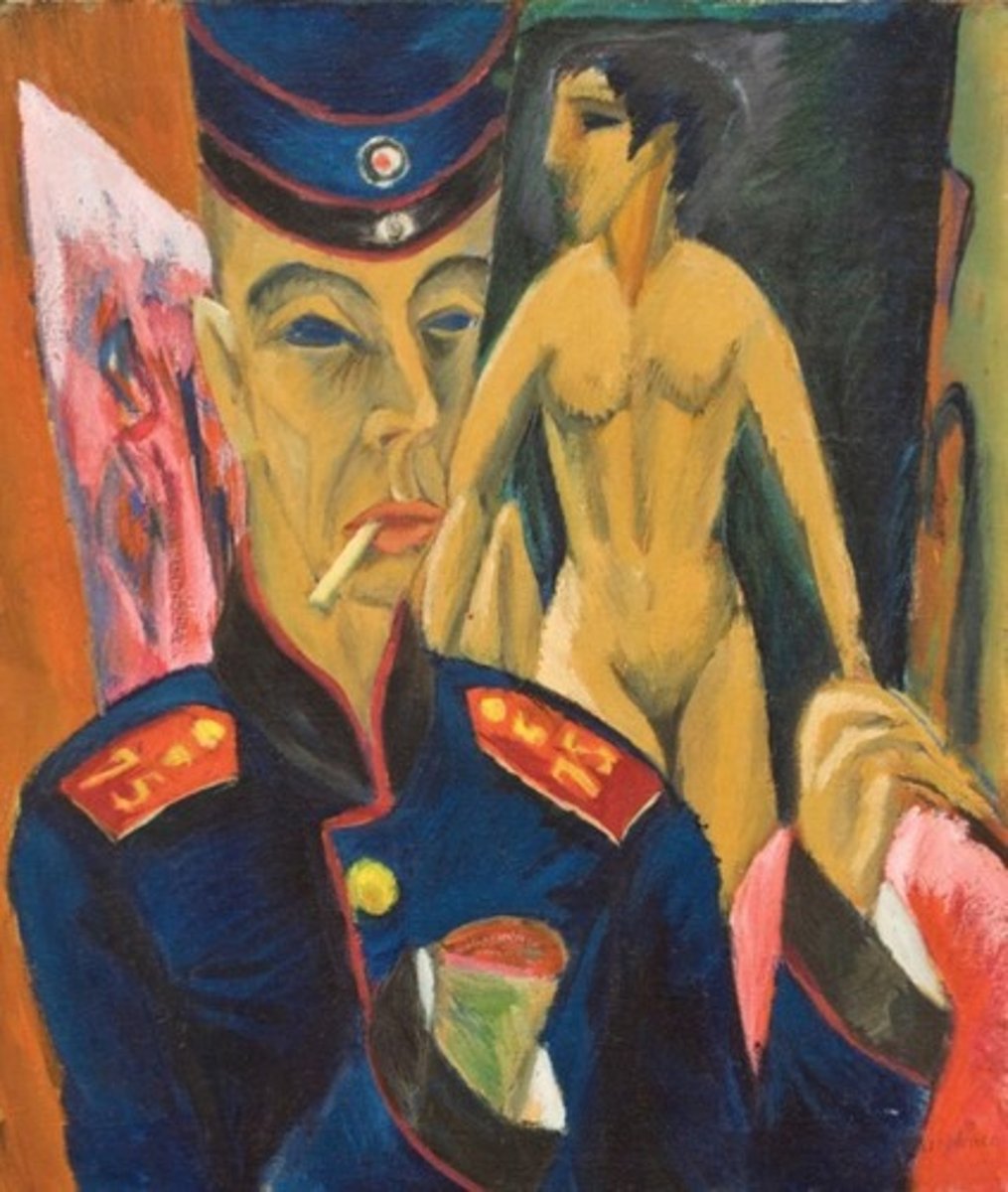
- themes of war and poverty dominate her works
- themes of women grieving over dead children; her son died in WWI, then she became a socialist
- Karl Liebknecht among the founders of the Berlin Spartacus League that became the German Communist Party
- 1919: Liebknecht shot to death during a Communist uprising in Berlin called the Spartacus Revolt
- no political reference in woodcut
- human grief dominates
- stark black and white of woodcuts to magnify grief
Memorial Sheet for Karl Liebknecht
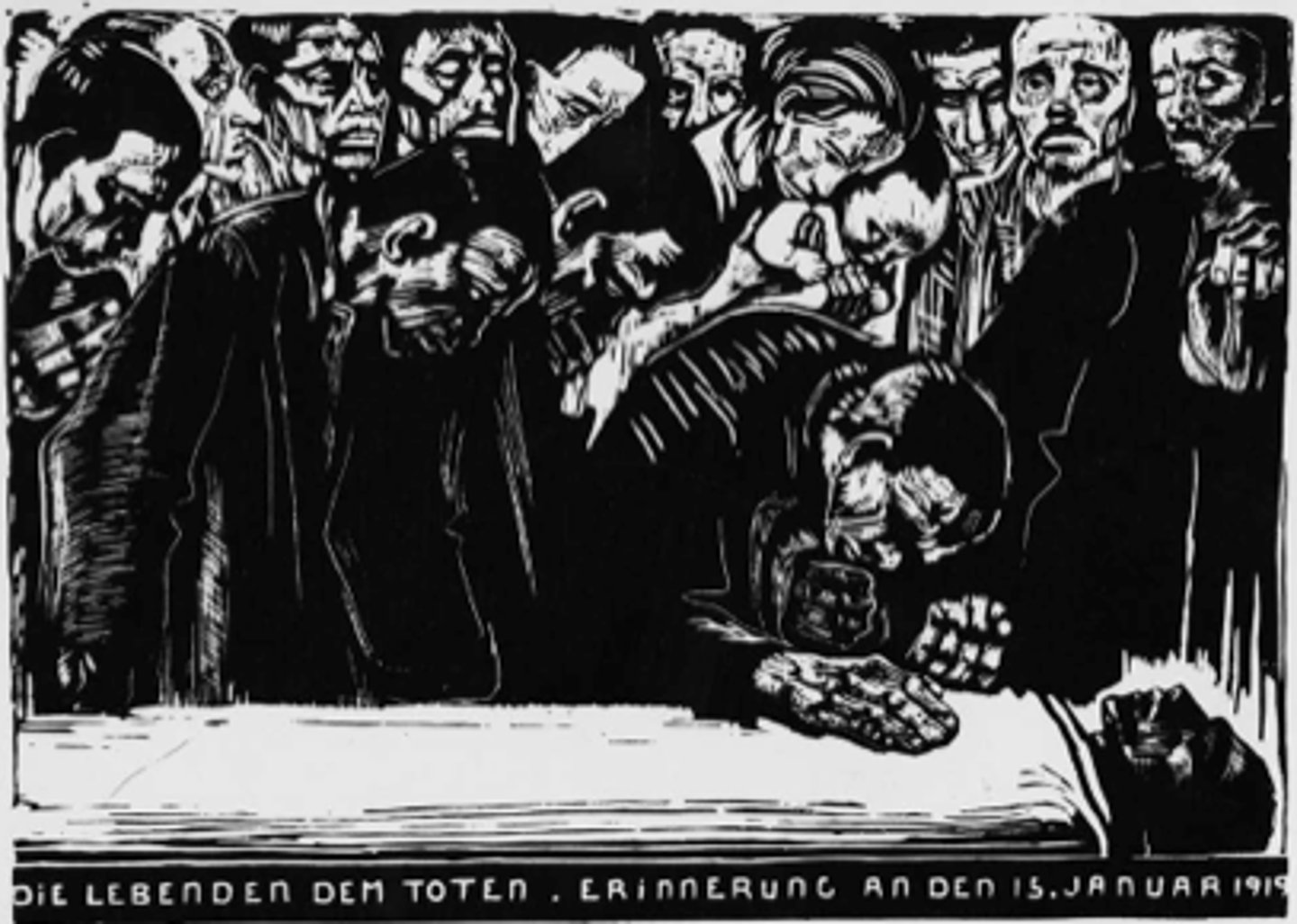
- first Cubist work, influenced by late Cezanne and African masks
- represents five prostitutes in a bordello on Avignon Street in Barcelona, each posing for a customer
- poses not traditionally alluring but awkward, expressionless, and uninviting
- three on left more conservatively painted, two on right more radical; reflects dichotomy in Picasso
- multiple views expressed at the same time
- no real depth
- influenced by Gauguin's primitivism
Les Demoiselles d'Avignon
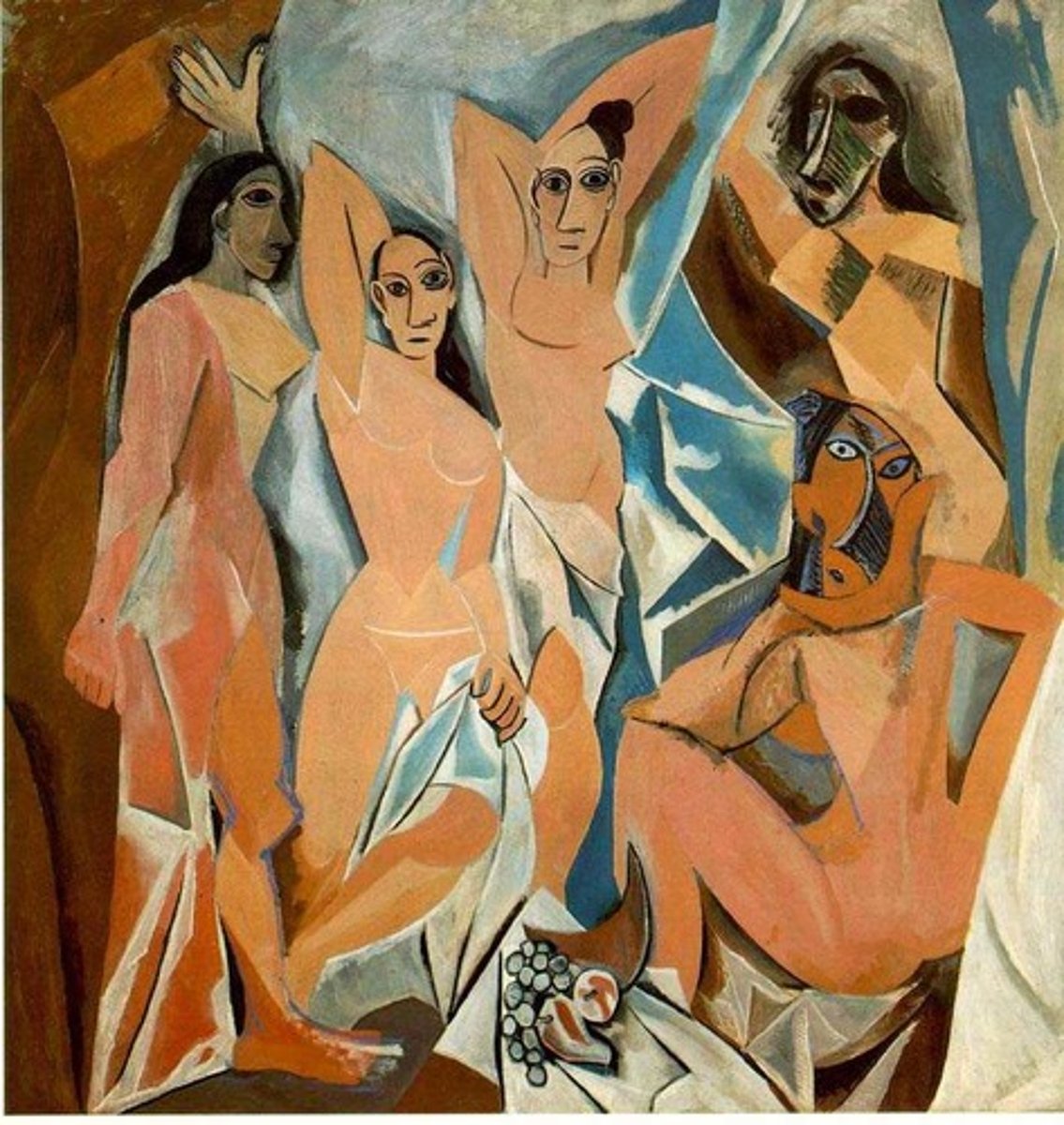
- Analytical Cubism; worked in concert w/ Picasso to develop this style
- rejected naturalistic and conventional painting
- fractured forms; breaking down objects into smaller forms
- clear-edged surfaces sit on picture plane, not recessed in space
- nearly monochrome
- not portrait of Portuguese musician; exploration of shapes
- only realistic elements: stenciled letters and numbers; suggest dance hall poster behind guitarist?
- cafe atmosphere
The Portuguese
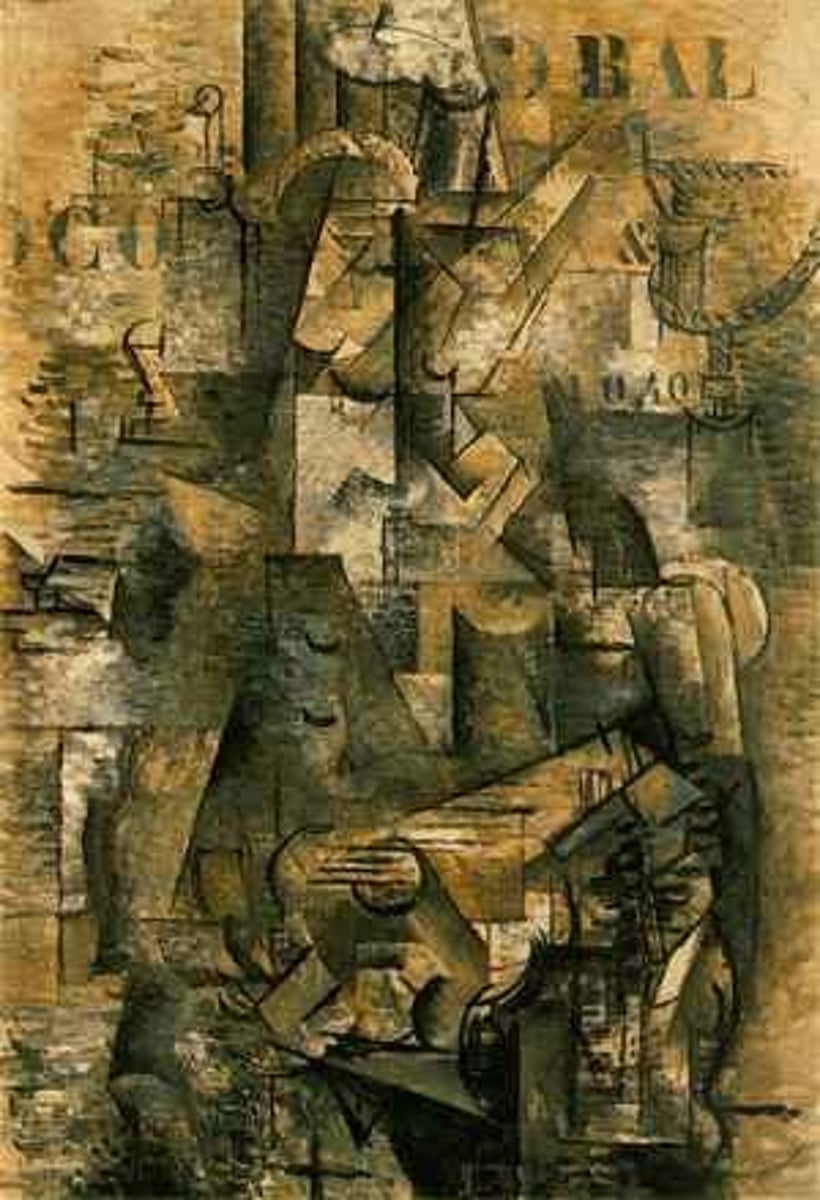
- symbolic, almost Cubist, rendering of male and female bodies
- intertwined and enveloped figures
- two eyes become one, almost Cyclops-like
- interlocked bodies
- Brancusi worked in Rodin's studio
- fourth stone version of this subject, done as a commission; first was one of Brancusi's earliest efforts at stone carving; second, a plaster cast, exhibited at the Armory Show; third used as tombstone in Montparnasse Cemetery in Paris over the body of a suicide victim: young Russian anarchist (artist asked by a friend of the deceased, who had jilted her, for a marking of her grave; artist said take what you want; he took this); there may have been many more undocumented versions
The Kiss (129)
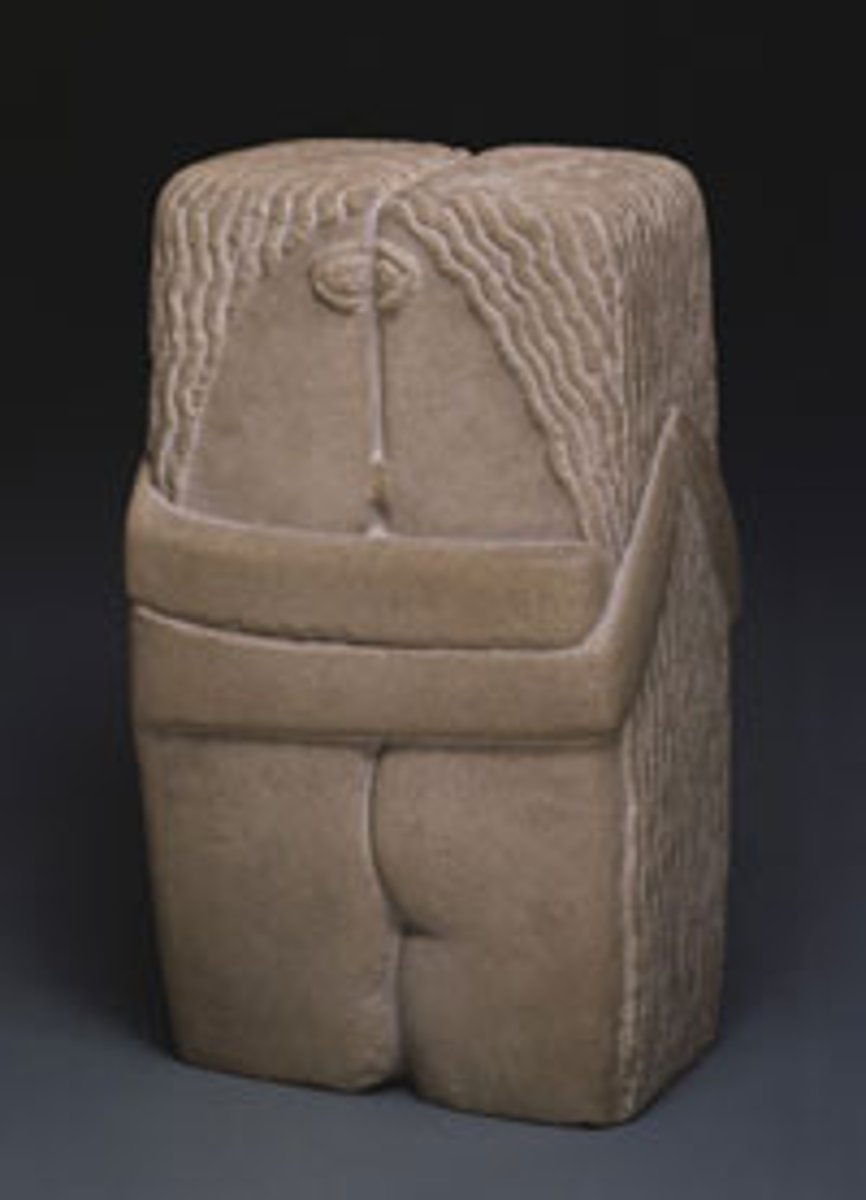
- photographed the world as he saw it, arranged little and allowed people and events to make their own compositions
- interested in compositional possibilities of diagonals and lines acting as framing elements
- diagonals and raming effects of ladders, sails, steam pipes, etc.
- depicted poorest passengers on a ship traveling from the US to Europe in 1907; some may have been people turned away from entrance to the US, more likely artisans whose visas had expired and were returning home
- published in October 1911 in Camera Work
- influenced by experimental European painting; compared to Busist drawing by Picasso; Cubist-like in arrangement of shapes and tonal values
- represents social divisions of society
- steerage: the part of a ship reserved for passengers w/ the cheapest tickets
The Steerage
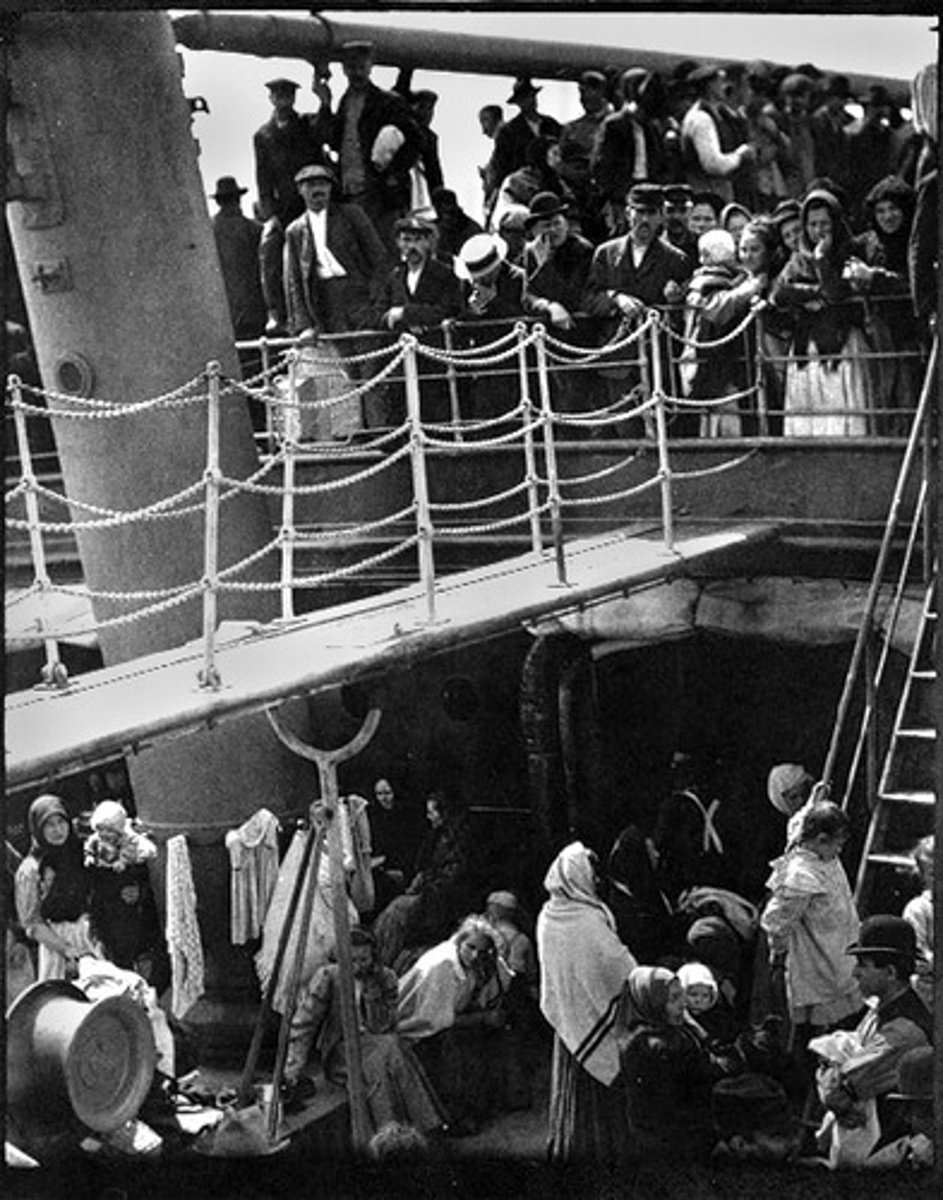
- ready-made, actually a found object Duchamp deemed to be a work of art
- entered in an unjuried show for the Society of Independent Artists (which he was a part of) under a different name; "accepted" but hid during the exhibition; resigned afterward
- signed by "artist" R. Mutt, a pun on Mutt and Jeff comic strip and Mott Iron Works
- title Fountain a pun; fountains spout liquid, a urinal meant to collect; added irony placing urinal upside down
Fountain (second version)
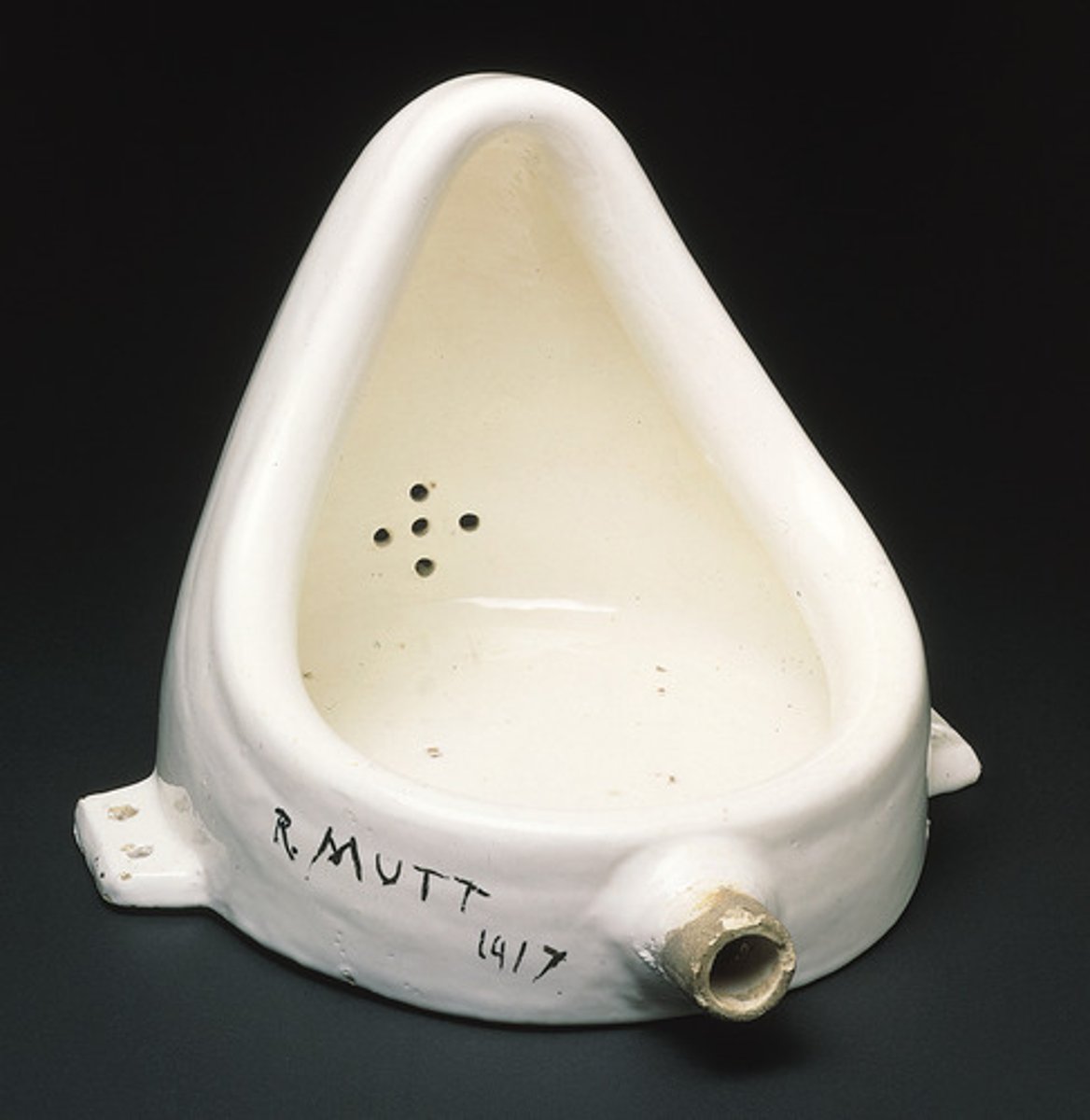
- done in response to Picasso's claim that anything looks good in fur; went to store right after meeting to buy materials
- combination of unlike objects: fur-covered teacup, saucer, and spoon
- erotic overtones
- assemblage
- combined traditionally female and genteel objects vs. masculinity of sculpture done in harde surfaces in great scale and made vertically
- chosen by visitors of a Surrealist show in New York as the quintessential Surrealist work of art
- fame came young (22 when she made it) and inhibited growth as an artist
Object (Le Petite-Déjeuner en Fourrure)
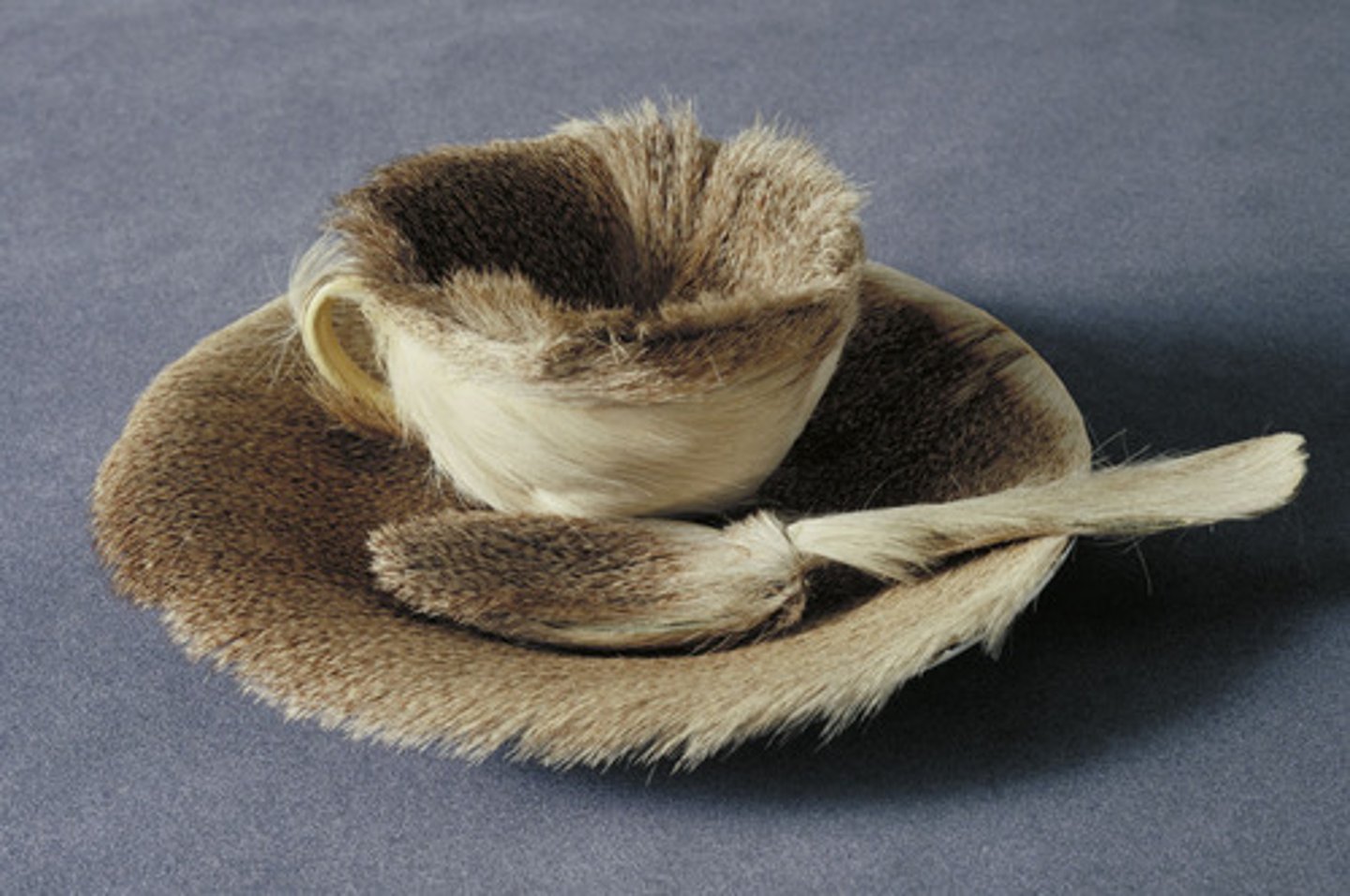
- juxtaposition of two self-portraits
- left: Kahlo dressed as a Spanish lady in white lace
- right: Kahlo dressed as a Mexican peasant; stiffness and provincial quality of Mexican folk art serves as direct inspiration for artist
- two hearts twined together by veins cut by scissors at one end and lead to portrait of husband, Rivera at other; painted at time of divorce
- barren landscape, two figures sit against wildly active sky
- rejected label of Surrealism
- vien acts as an umbilical cord, symbolically associating Rivera as husband and son
- blood on lap suggests many abortions and miscarriages, also her surgeries related to her polio
The Two Fridas

- Cuban-born artist whose career took him to Europe and US
- interested in Cuba's mixture of Hispanic and African cultures
- influenced by African sculpture; Cubist works; Surrealist paintings (member of Surrealist movement in Paris)
- "intended to communicate a psychic state"
- addresses history of slavery in colonial Cuba
- crescent-shaped faces suggest African masks
- rounded backs, thin arms and legs, pronounced hands and feet
- meant to suggest sugarcane, which are grown in field, not jungles
The Jungle
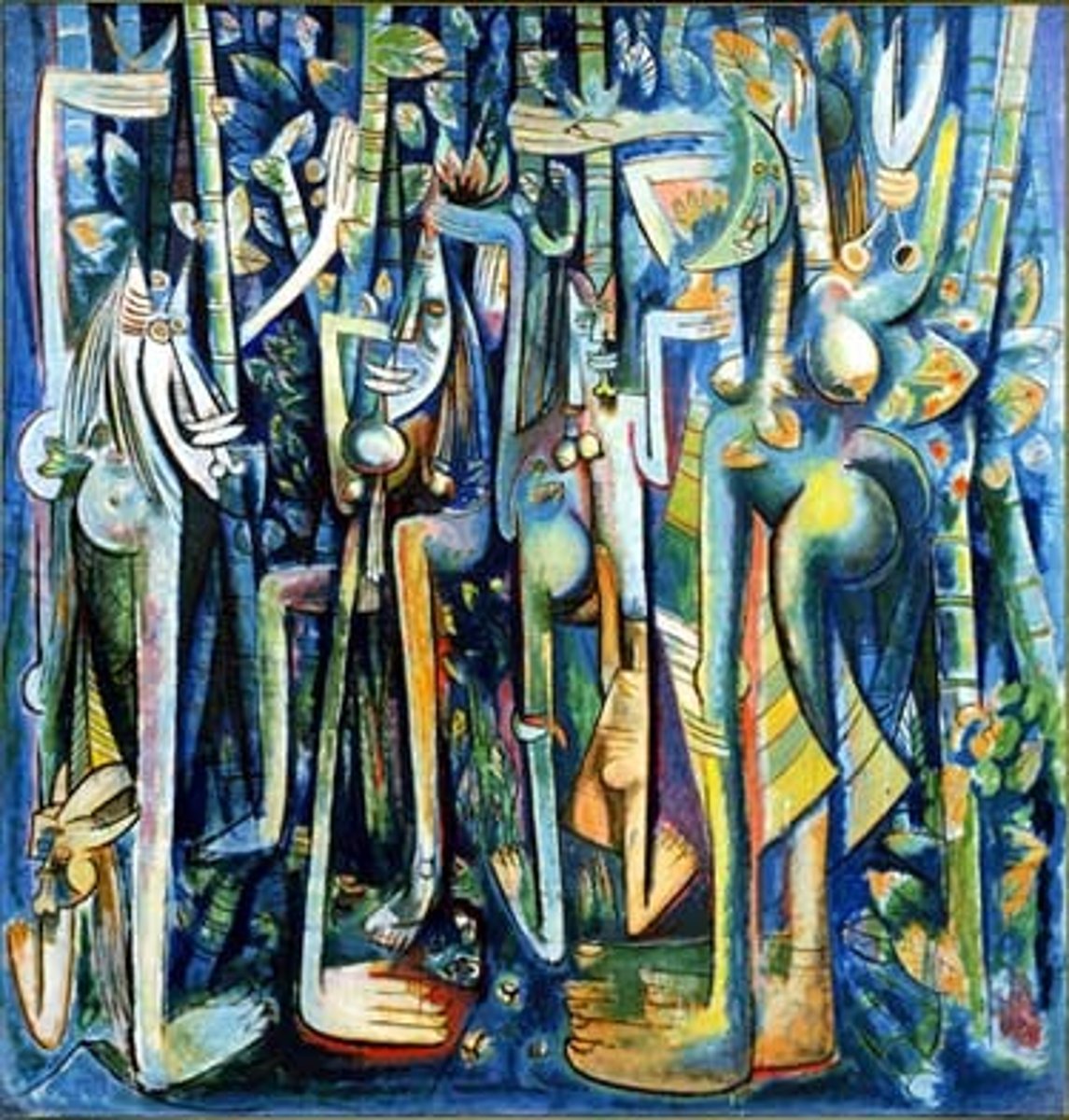
- one of main figures in Russian avant-garde movement
- graphic art for political and propaganda purposes
- influenced by Cubism and Futurism
- five year plan: Soviet practice of increasing agricultural and industrial output in five years; launched in 1928; considered complete in 1932
- emphasis on growth of heavy industry rather than consumer goods
- hugs increases in electrical output (dominant industrial symbol in work)
- double page spread in a book
- red dominates: color of Communist Soviet Union
- CCCP Russian abbreviation for the Soviet Union
- large portrait of Lenin dominates; although deceased, his image is used to stimulate patriotism
Illustration from The Results of the First Five-Year Plan
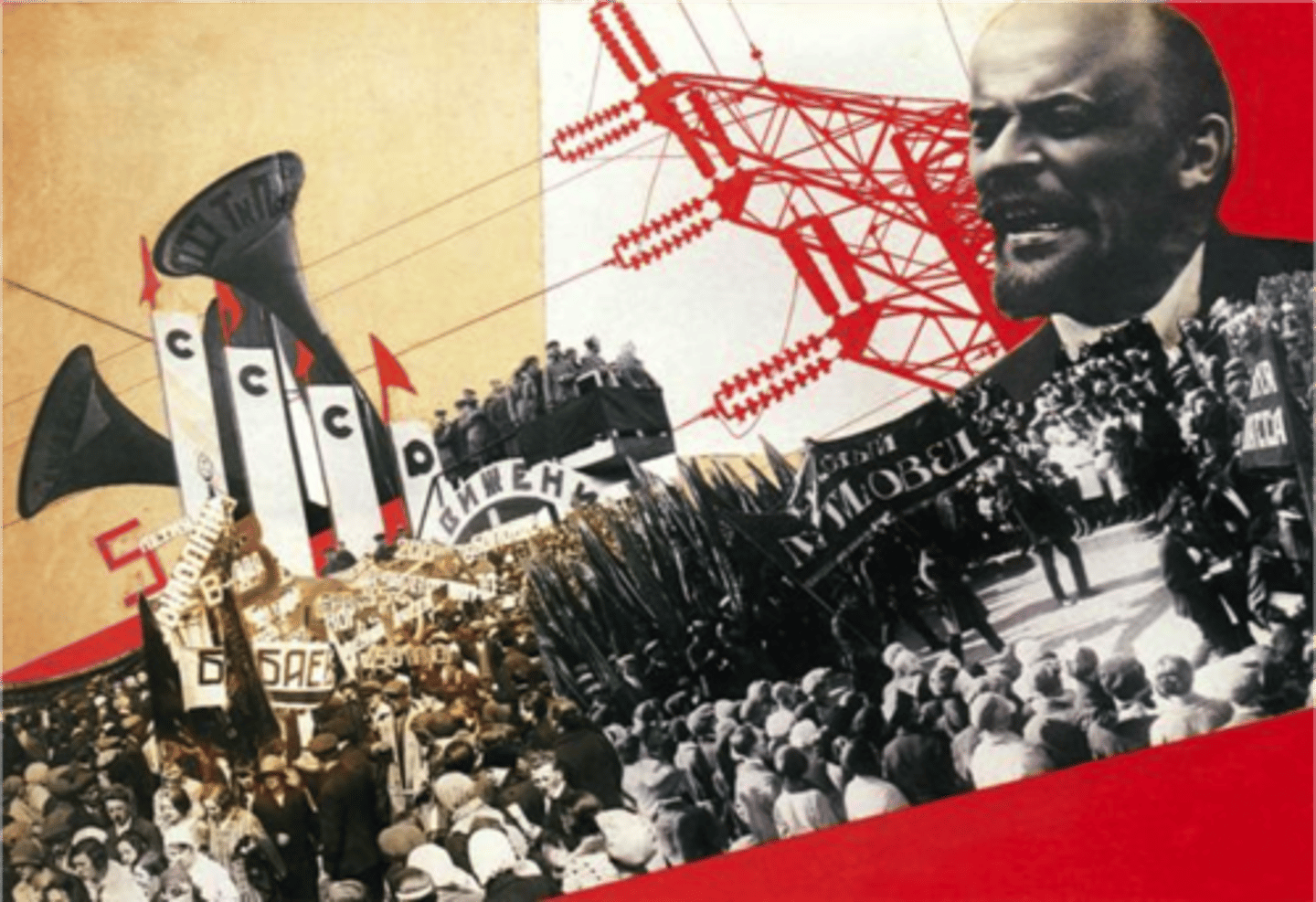
- only primary colors used
- severe geometry of form, only right angles; gridlike forms
- no shading of colors
- asymmetrical composition
Composition with Red, Blue and Yellow
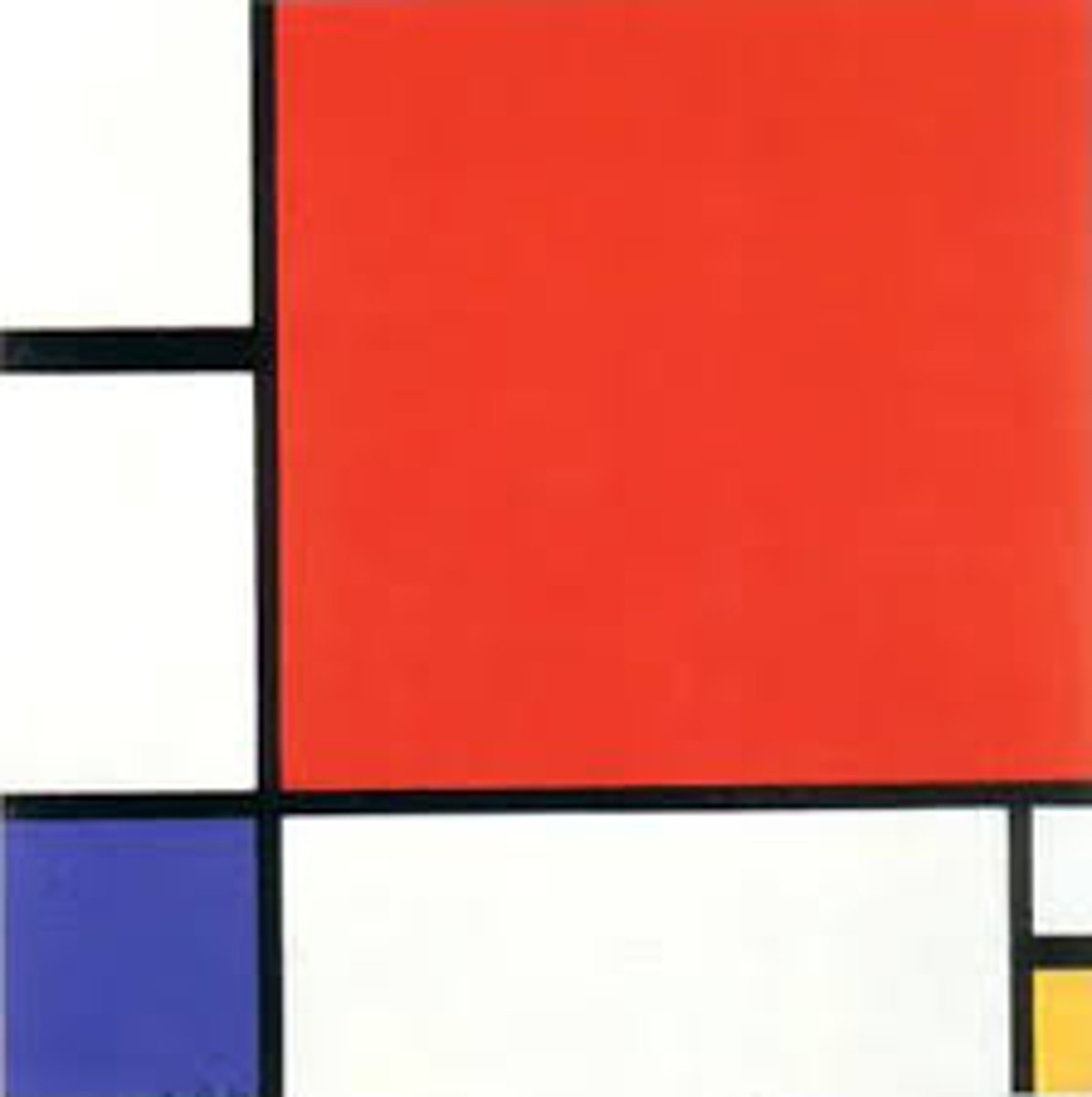
- cantilevered porches extend over waterfall; accent on horizontal lines; architecture in harmony w/ site
- living room contains glass curtain wall around 3/4 sides; embraces woods around
- floor of living room and walls of building made from stone of the area
- hearth is center of house, an outcropping of natural stones surrounds it
- suppression of space devoted to hanging a painting; Wright wanted architecture to dominate
- irregularity and complexity of ground plan and design
Fallingwater
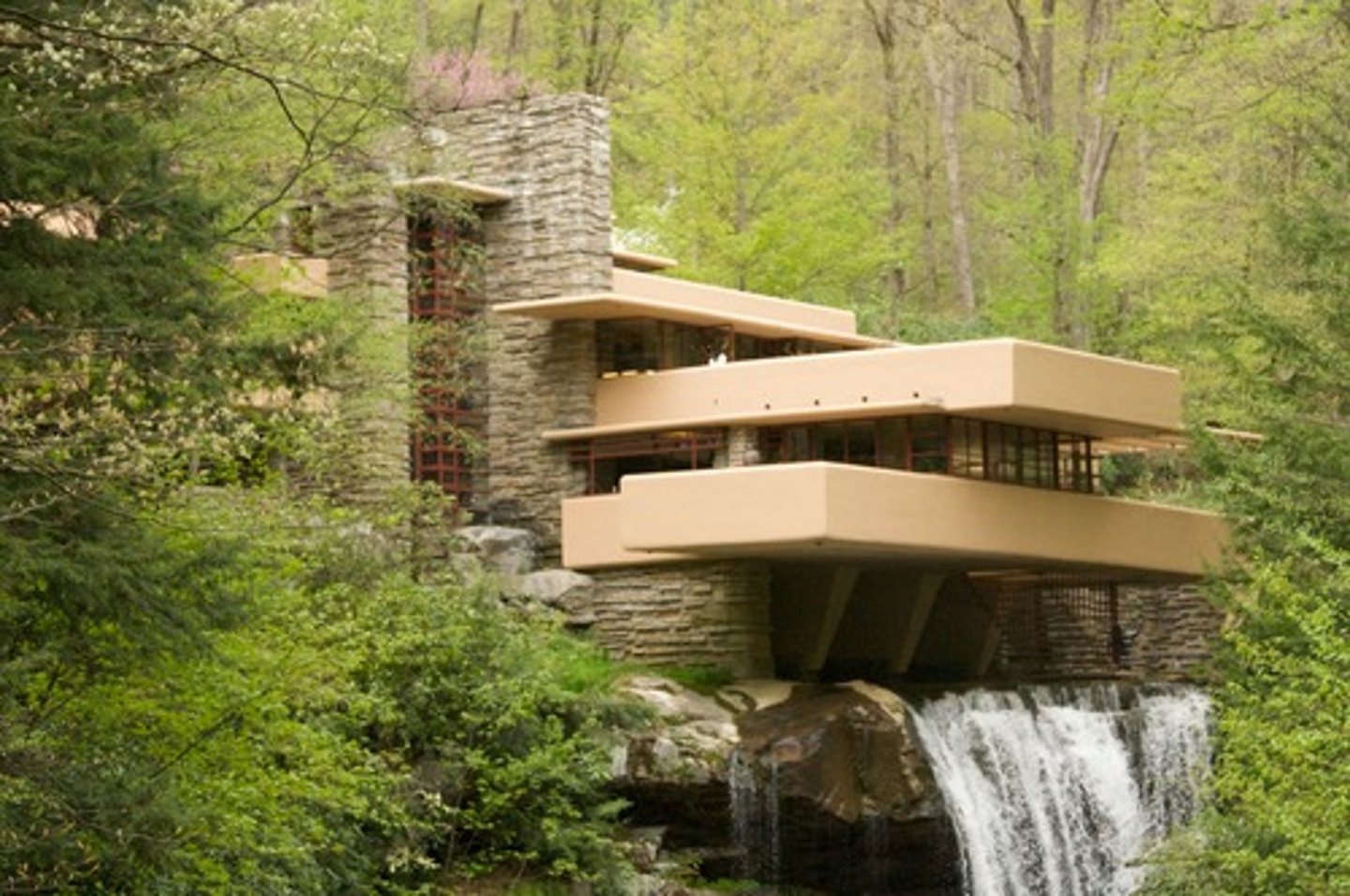
- three bedroom villa w/ servant's quarters
- boxlike horizontal quality; abstraction of a house
- main part lifted off ground by narrow pilotis; house appears to float on them
- turning circle on bottom floor a carport, so that family members can enter directly from car
- all space utilized, including roof (patio)
- no historical ornamentation
- subtle colors: white on exterior symbolized modern cleanliness, the new, simplicity, healthful living
- open interior free of many walls
- furniture build into walls
- ribbon windows wind around second floor
- streamlined look
- living spaces around open courtyard-type setting on second floor; surrounded by glass
- patrons: Pierre Emilie Savoye, wanted a country house
Villa Savoye
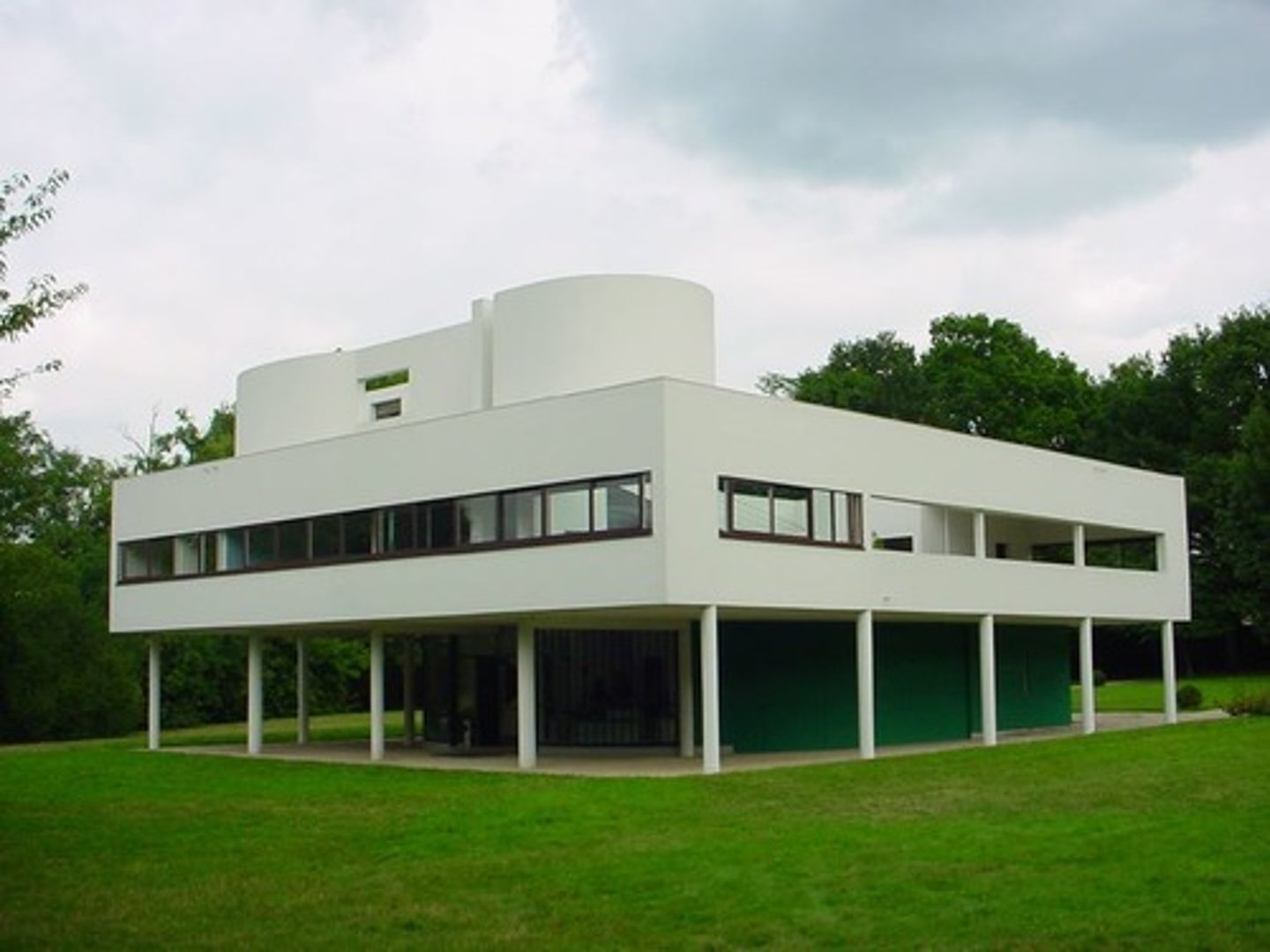
- reflection of Minimalist movement in painting
- "less is more" can be seen in this building: great simplicity, geometry of design, elegance of construction
- set back from street on wide plaza balanced by reflecting pools
- bronze veneer gives skyscraper monolithic look
- interplay of vertical and horizontal accents
- steel-and-glass skyscraper became the model after WWI
- triumph of International Style
Seagram Building
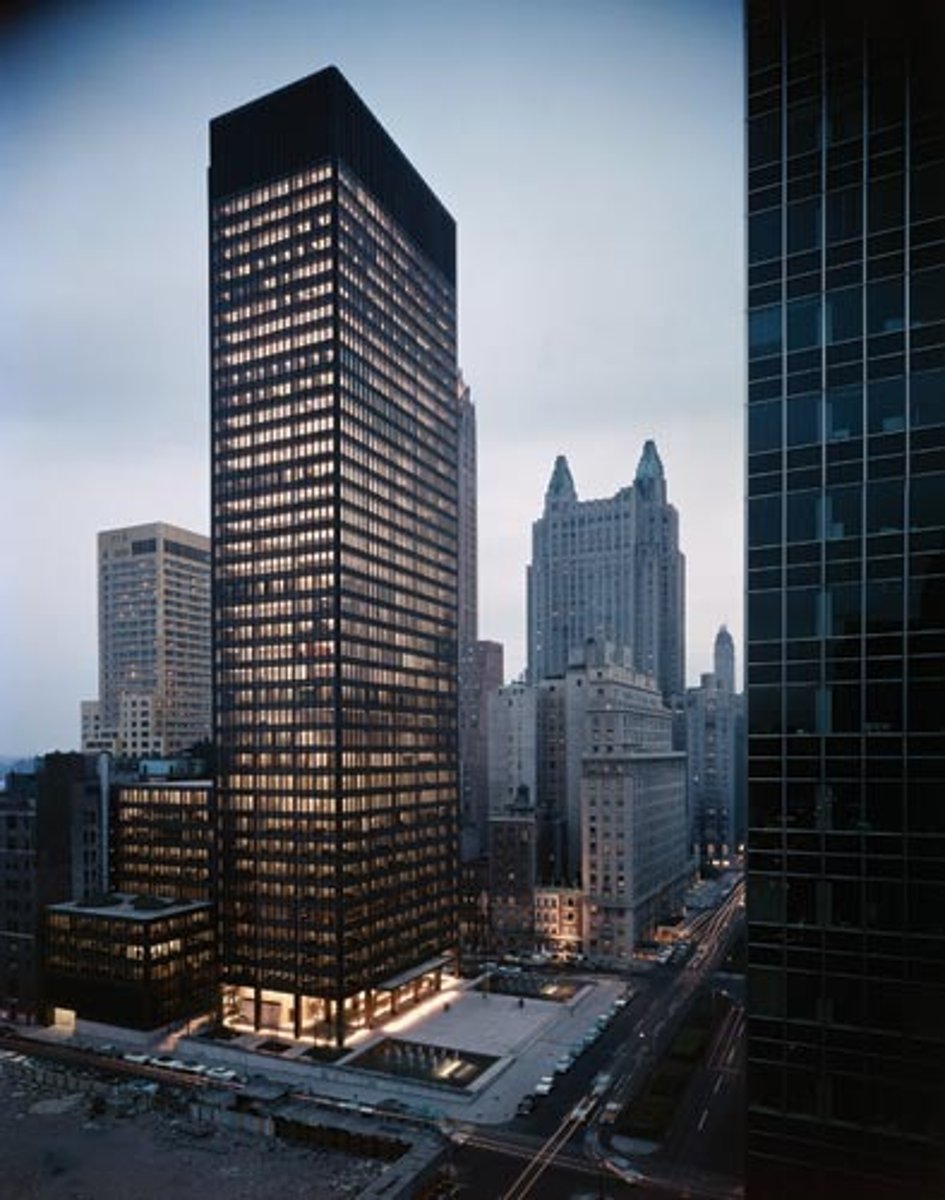
- series of 60 paintings depicting migration of African-Americans from rural south to urban North after WWI
- overall color unity in series unites each painting
- forms hover in large spaces
- flat simple shapes
- unmodulated colors
- collective African-American experience, little individuality to figures
- goes back to tempera paint; influenced by Italian masters of 14th and 15th centuries
- collective unity achieved by painting one color across many panels before going on to next color
- angularity of forms
- scene involved public restaurant in North; segregation emphasized by yellow poles that zigzag down center
- titled table tops show surface of table
- narrative painting in an era of increasing abstraction
The Migration of the Negro
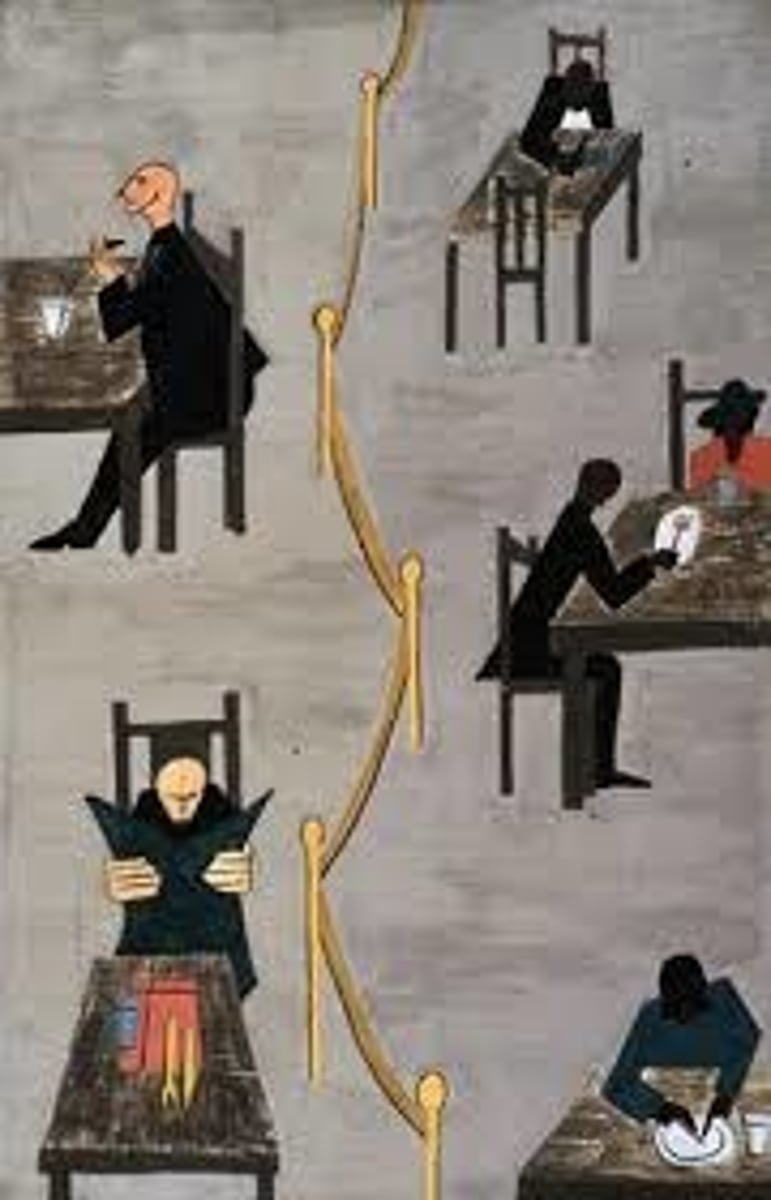
- 50 x 13 feet
- originally in lobby of Hotel Del Prado
- after 1985 earthquake that destabilized hotel, placed in Alameda Park, Mexico City's first city park; build on grounds of Aztec marketplace
- three ears of Mexican history depicted: conquest and colonization of Mexico by Spanish; Porfirio Diaz dictatorship; revolution of 1910
- depicts a who's who of Mexican politics, culture, and leadership: Sor Juana; Benito Juarez, five term president; General Santa Ana handing the Keys of Mexico to General Winfield Scott; Emperor Maximilian and Empress Carlota; Jose Marti, father of Mexican independence (tipping hat); General Porfirio Diaz w/ medals, asleep; police officer ordering a family out of an elitist park; Francisco Madero, martyred president; artist at center, age ten, holding hands with Caterina ("Death") dreaming of a perfect love, w/ Kahlo behind
- horror vacui; didactic; colorful
- revival of fresco painting, a Mexican specialty
Dream of a Sunday Afternoon in the Alameda Park
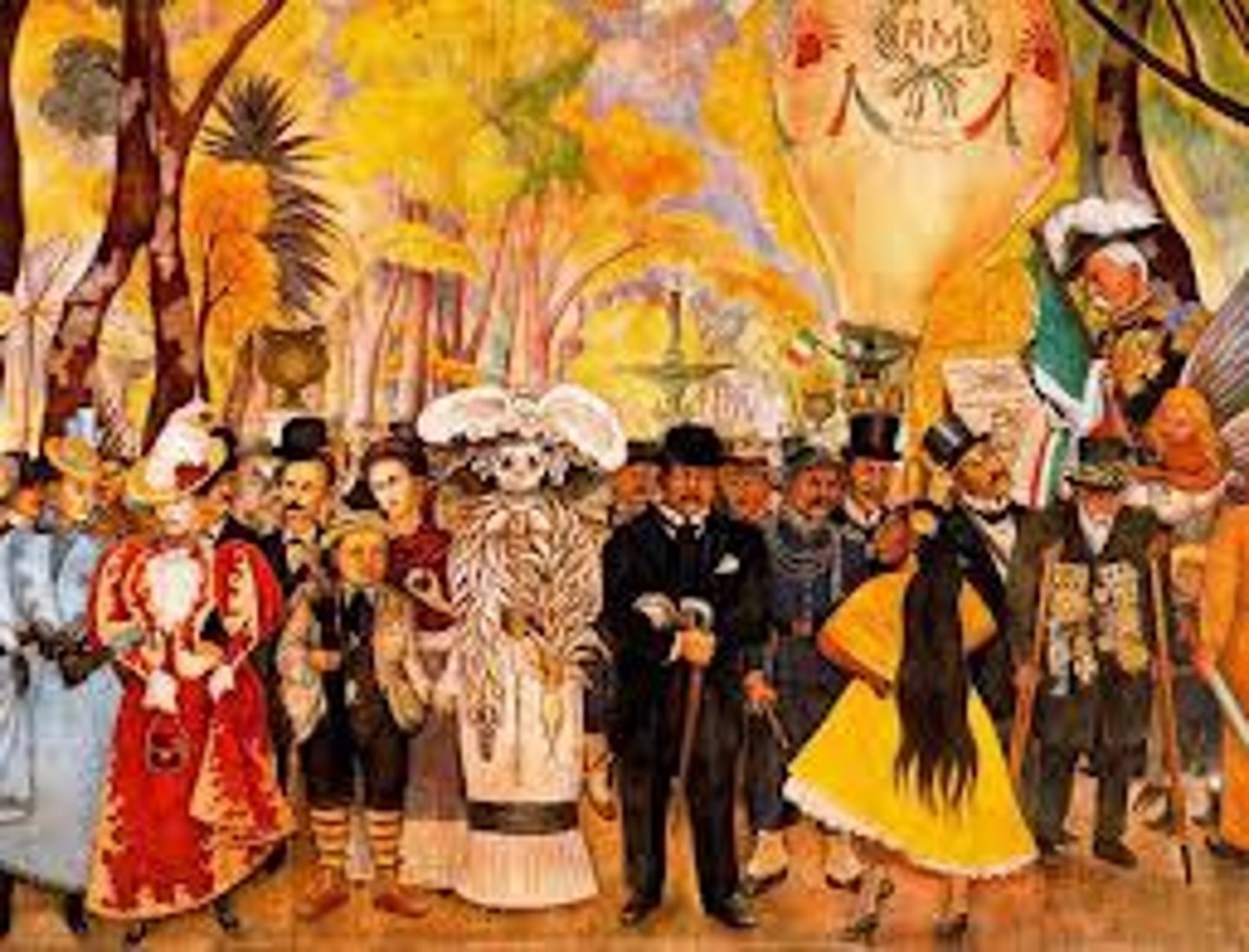
- ferocious woman w/ great fierce teeth and huge eyes
- large bulbous breasts satire on women who appear in magazine ads; smile said to be influenced by ad of woman selling Camel cigarettes
- slashing of paint onto canvas
- jagged lines create overpowering image
- smile cut out of female smile from magazine ad
- blank stare; frozen grin
- ambiguous environment: vagueness, insecurity
- combination of stereotypes; ironic comment on banal and artificial world of film and ads
- one of series of six on woman theme
- influenced by everything: Paleolithic goddesses to pin-up girls
- think and think black lines dominate
Woman, I
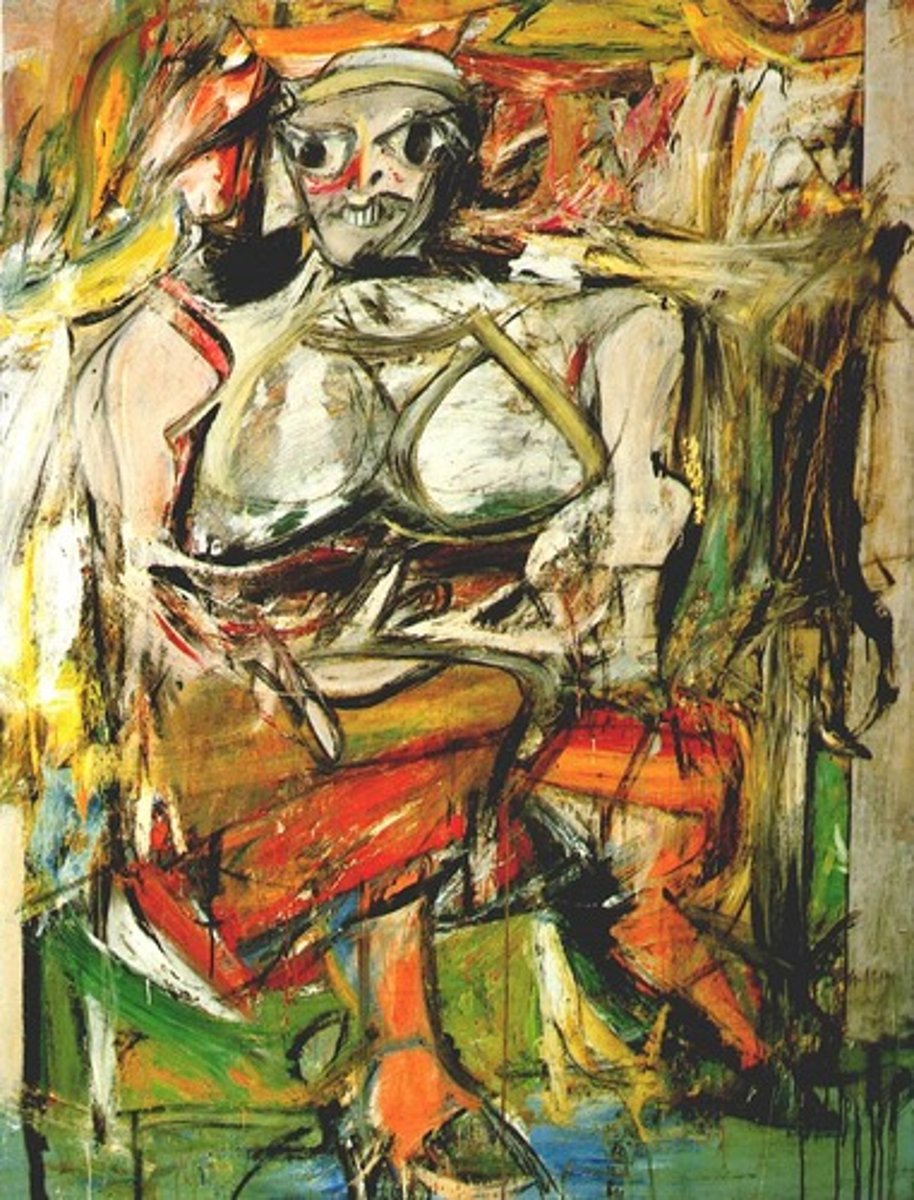
- painted directly on unprimed canvas; absorbs paint more directly
- uses runny paint, sometimes thinned w/ turpentine
- landscape as starting point; basis for imagery in the works
- accentuates 2dness of canvas
- worked in avant-garde New York School at mid-century
The Bay
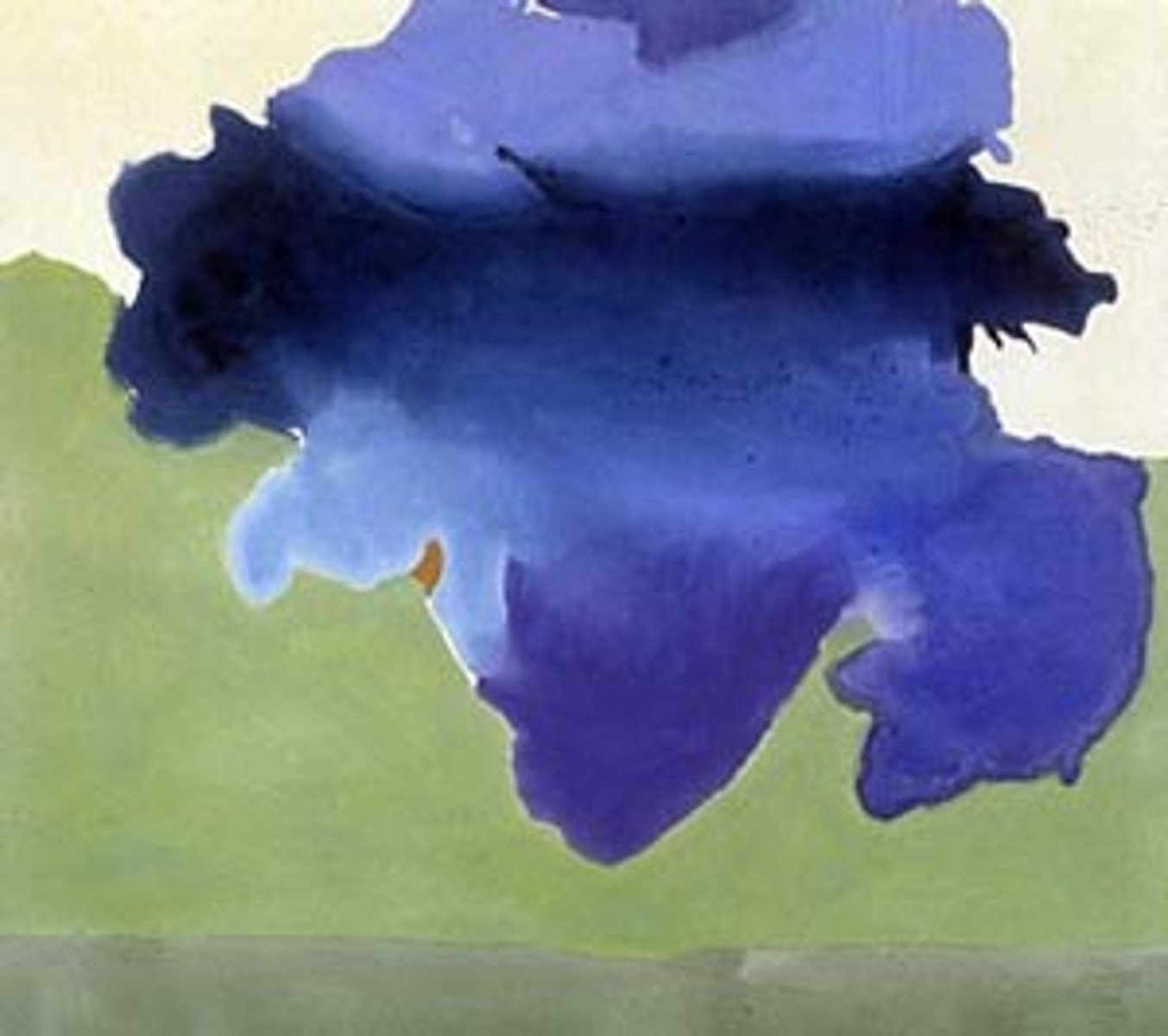
- screen=printing photographic images onto backgrounds of rectangular shapes
- repeated imagery drains image of Monroe of meaning
- 50 images from film still from a movie, Niagara
- cult of celebrity
- left, in color, represents her in life; right, in black and white, represents her death; work down four months after tragic death
- Marilyn's public face appears highlighted by bold, artificial colors
- private persona of individual submerged beneath public face
- social characteristics magnified: brilliance of blonde hair, heavily applied lipstick, seductive expression
Marilyn Diptych
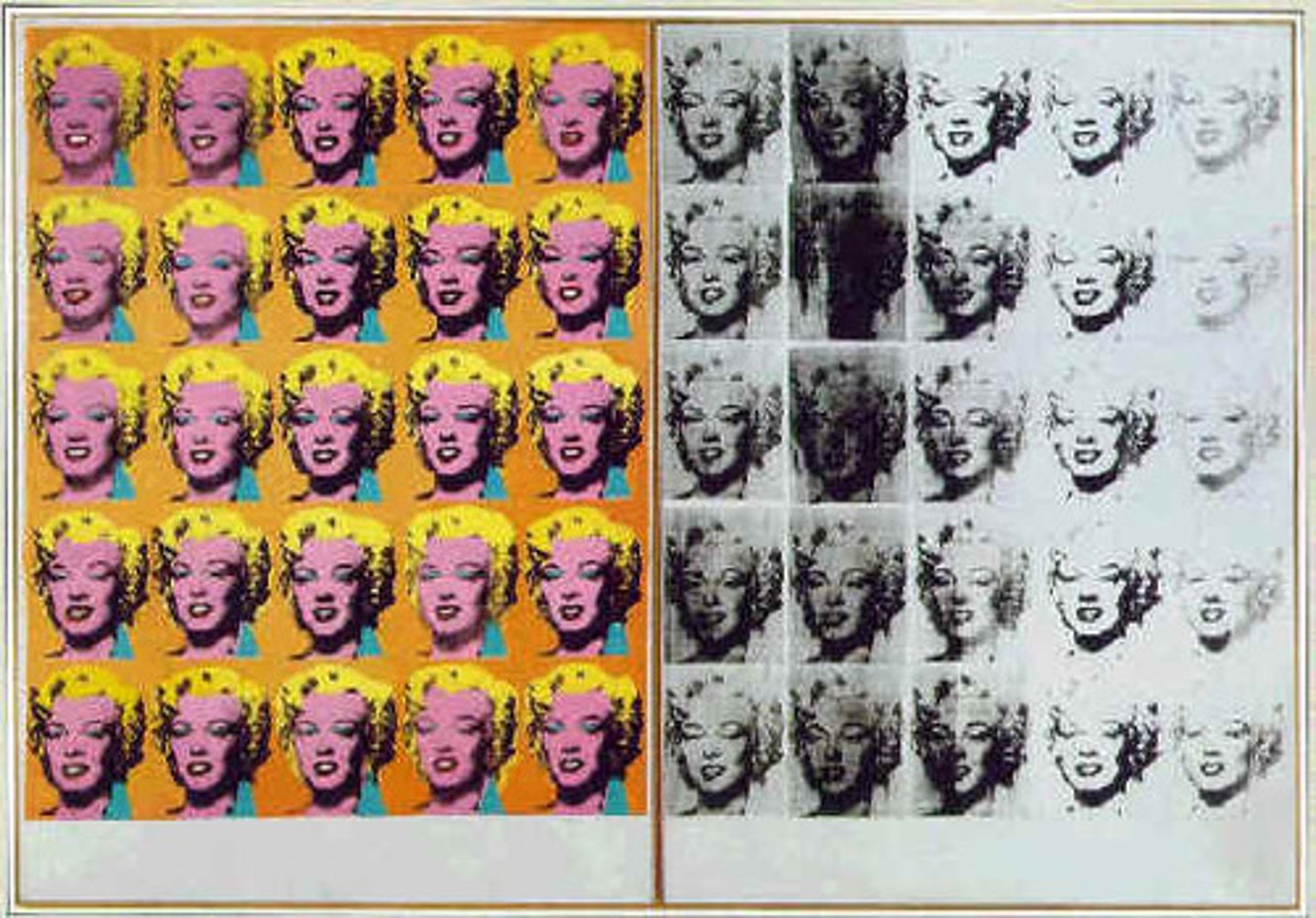
- first installed on Beinecke Plaza, New Haven, in 1969
- intended as a platform for public speakers; rallying point for anti-Vietnam era protests
- erected secretly
- tank-shaped platform base w/ lipstick ascending--anti-war symbolism
- male and female forms unite: themes of death, power, desire, and sensuality
- sculpture made of inexpensive and perishable materials
- refurbished w/ steel, aluminum, fiberglass; reinstalled in 1974 in front of Morse College at Yale
- first monumental sculpture by Oldenburg
Lipstick (Ascending) on Caterpillar Tracks
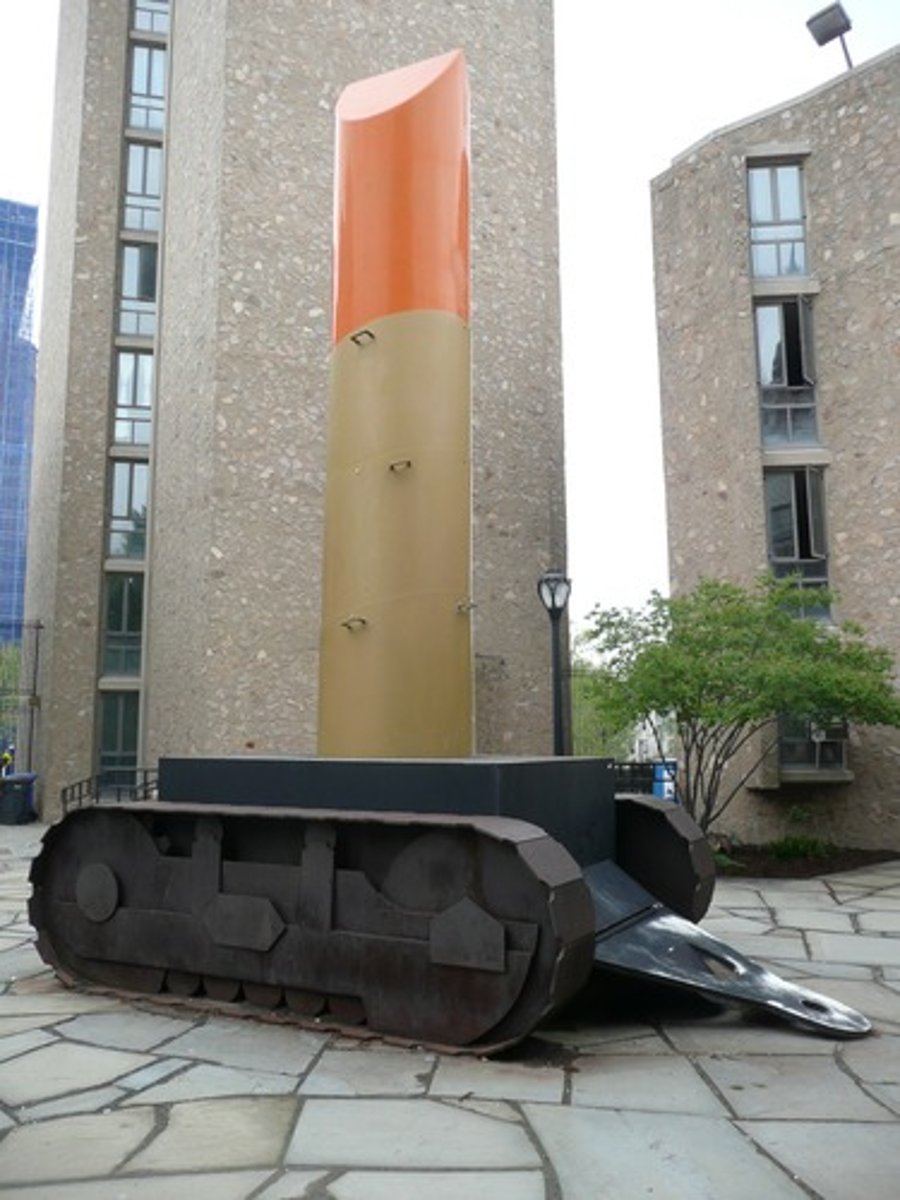
- Kusama: internationally renowned Japanese-born artist; got start sowing large works of art featuring huge polka dots; one of foremost innovators of Happenings; works in a wide variety of media, including installations
- originally featured as non-participant in 1966 Venice Biennale
- 1500 large, mirrored, stainless steel balls placed on lawn under sign: "Your Narcissism for Sale"
- artist offered balls for 1200 lira ($2 each) as commentary on commercialism and vanity of current art world
- references ancient myth of Narcissus, young man so enraptured by own image in reflecting water, he stares at it indefinitely until he becomes a flower
- later moved to water, where floating balls reflect natural environment (and viewers) around work; placement makes stronger connection to myth
- move w/ currents of water and wind, reflecting organically made ever-changing viewpoints
- installation has been exhibited in many places around the world, both in water and in dry spaces
Narcissus Garden
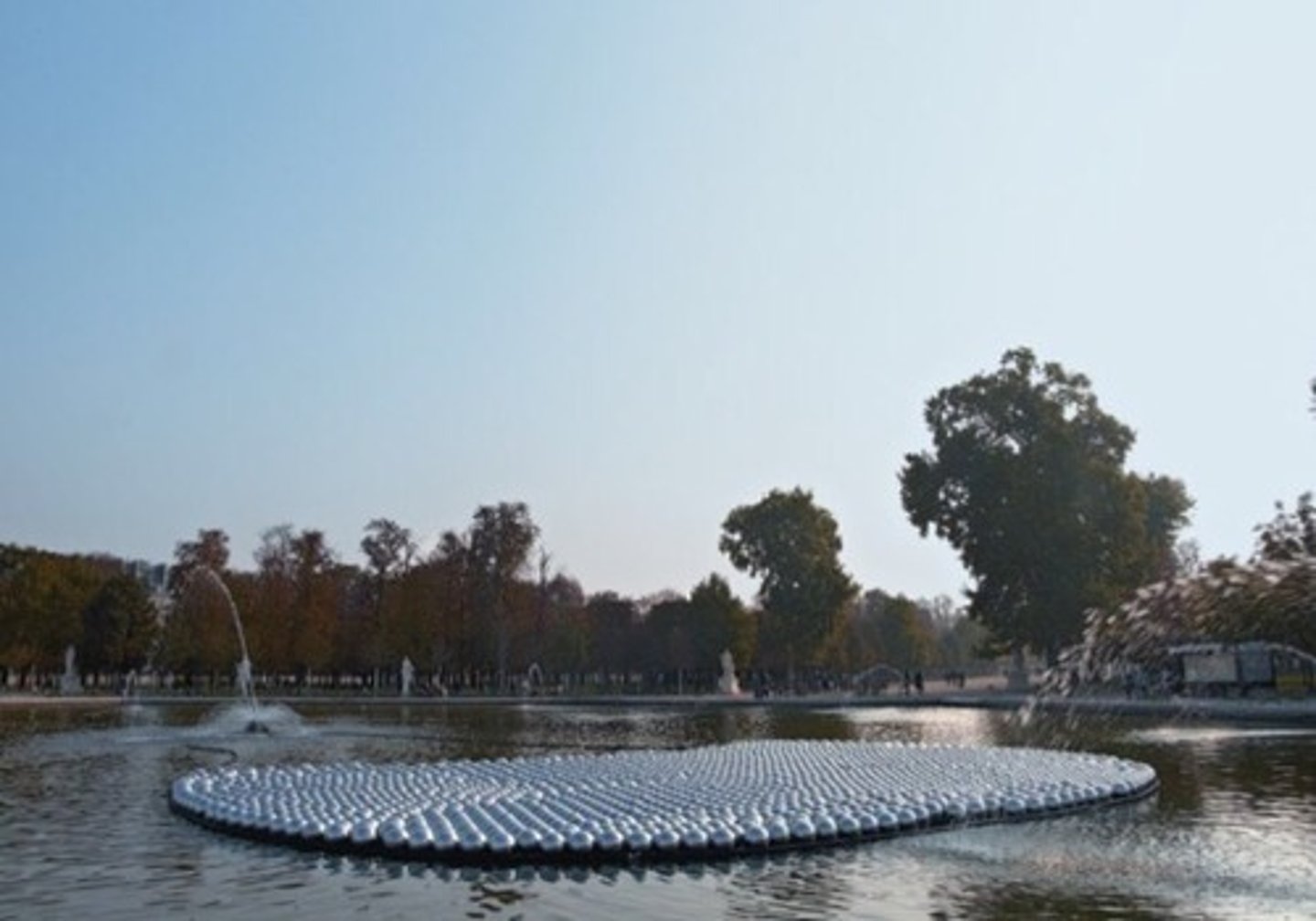
- coil of rock in part of Great Salt Lake; in extremely remote and inaccessible area that features abandoned mines and equipment
- upon walking on, twisting and curling path changes participant's view from every angle
- tractor w/ native stone used to create
- a jetty is supposed to be a pier in the water; now transformed into curl of rocks sitting silently in vast empty wilderness
- coil image seen in North American earthworks
- artist liked blood red color of water due to presence of bacteria that live in high salt content
Spiral Jetty
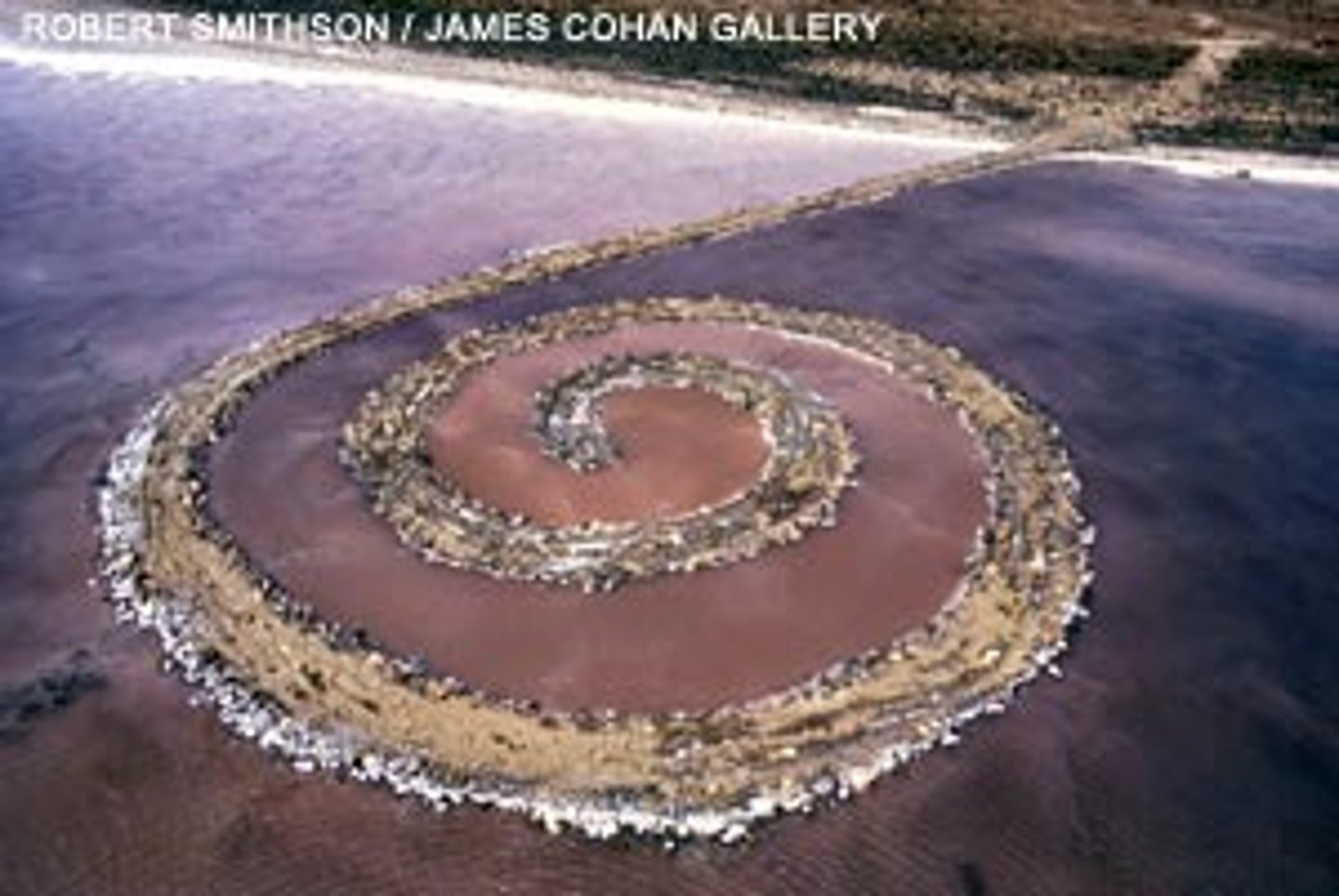
- house designed for family of three
- wife: musician; hence music room w/ two pianos, an organ, and a harpsichord
- husband: bird watcher; large windows facing woods
- post-modern mix of historical styles
- Venturi's comment on International Style: "Less is a bore"
House in New Castle County
